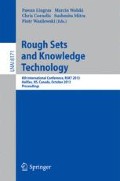Abstract
When arbitrary sets are approximated by more structured sets, it may not be possible to obtain an exact approximation that is equivalent to a given set. A proposal is presented for a ‘metric’ approach to Rough Sets. This includes a definition of the ‘optimal’ or best approximation with respect to a measure of similarity, and an algorithm to find it using the Jaccard Index. A definition of consistency also allows the algorithm to work for a larger class of similarity measures. Several consequences of these definitions are also presented.
Access this chapter
Tax calculation will be finalised at checkout
Purchases are for personal use only
Preview
Unable to display preview. Download preview PDF.
References
Pawlak, Z.: Rought Sets. International Journal of Computer and Information Sciences 34, 557–590 (1982)
Pawlak, Z.: Rough Sets. Kluwer, Dordrecht (1991)
Bretcher, O.: Linear Algebra with Applications. Prentice Hall (1995)
Jaccard, P.: Étude comparative de la distribution florale dans une portion des Alpes et des Jura. Bulletin de la Société Vaudoise des Sciences Naturalles 37, 547–549 (1901)
Dice, L.R.: Measures of the Amount of Ecologic Association Between Species. Ecology 26(3), 297–302 (1945)
Sørensen, T.: A method of establishing groups of equal amplitude in plant sociology based on similarity of species and its application ro analysis of the vegetation on Danish commons. Biologishe Skrifter 5(4), 1–34 (1957)
Janicki, R.: Property-Driven Rough Sets Approximations of Relations. In: [9], pp. 333–357
Skowron, A., Stepaniuk, J.: Tolarence approximation spaces. Fundamenta Informaticae 27, 245–253 (1996)
Skowron, A., Suraj, Z. (eds.): Rough Sets and Intelligent Systems. ISRL, vol. 42. Springer, Heidelberg (2013)
Yao, Y.Y., Wang, T.: On Rough Relations: An Alternative Formulation. In: Zhong, N., Skowron, A., Ohsuga, S. (eds.) RSFDGrC 1999. LNCS (LNAI), vol. 1711, pp. 82–91. Springer, Heidelberg (1999)
Janicki, R.: Approximations of Arbitrary Binary Relations by Partial Orders: Classical and Rough Set Models. In: Peters, J.F., Skowron, A., Chan, C.-C., Grzymala-Busse, J.W., Ziarko, W.P. (eds.) Transactions on Rough Sets XIII. LNCS, vol. 6499, pp. 17–38. Springer, Heidelberg (2011)
Saquer, J., Deogun, J.S.: Concept approximations based on Rough sets and similarity measures. Int. J. Appl. Math. Comput. Sci. 11(3), 655–674 (2001)
Słowiński, R., Vanderpooten, D.: A Generalized Definition of Rough Approximations Based on Similarity. IEEE Tran. on Knowledge and Data Engineering 12(2), 331–336 (2000)
Düntsch, I., Gediga, G., Lenarcic, A.: Affordance Relations. In: Sakai, H., Chakraborty, M.K., Hassanien, A.E., Ślęzak, D., Zhu, W. (eds.) RSFDGrC 2009. LNCS, vol. 5908, pp. 1–11. Springer, Heidelberg (2009)
Rezai, H., Emoto, M., Mukaidono, M.: New similarity Measure Between Two Fuzzy Sets. Journal of Advanced Computational Intelligence and Intelligent Informatics 10(6), 946–953 (2006)
Tversky, A.: Features of similarity. Psychological Reviews 84(4), 327–352 (1977)
Halmos, P.: Measure Theory, Van Nostrand (1950)
Kleinberg, J., Tardos, E.: Algorithm Design. Addison-Weslay (2005)
Author information
Authors and Affiliations
Editor information
Editors and Affiliations
Rights and permissions
Copyright information
© 2013 Springer-Verlag Berlin Heidelberg
About this paper
Cite this paper
Janicki, R., Lenarčič, A. (2013). Optimal Approximations with Rough Sets. In: Lingras, P., Wolski, M., Cornelis, C., Mitra, S., Wasilewski, P. (eds) Rough Sets and Knowledge Technology. RSKT 2013. Lecture Notes in Computer Science(), vol 8171. Springer, Berlin, Heidelberg. https://doi.org/10.1007/978-3-642-41299-8_9
Download citation
DOI: https://doi.org/10.1007/978-3-642-41299-8_9
Publisher Name: Springer, Berlin, Heidelberg
Print ISBN: 978-3-642-41298-1
Online ISBN: 978-3-642-41299-8
eBook Packages: Computer ScienceComputer Science (R0)

